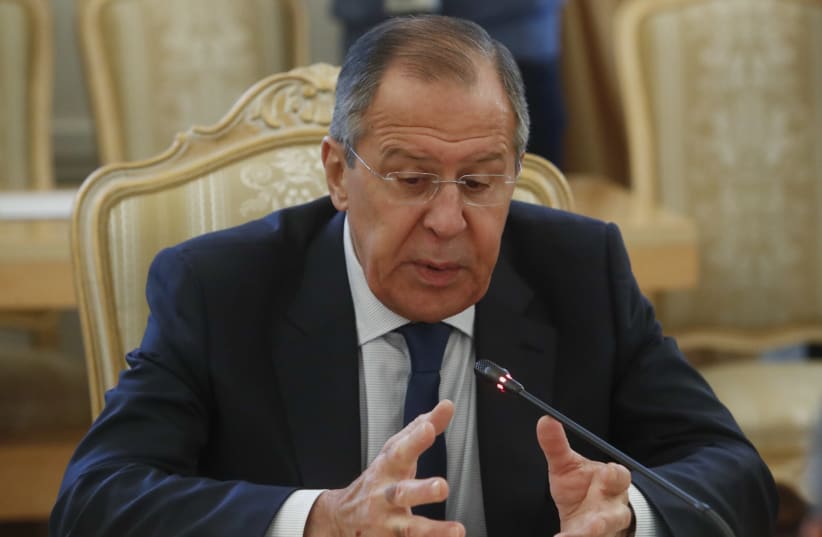The US is trying to thwart a two-state solution with the Trump administration’s “deal of the century,” Russian Foreign Minister Sergei Lavrov said in Riyadh on Monday, making clear Moscow will not be helping Washington get Arab or Palestinian buy-in to the deal.
Lavrov, at a press conference in Riyadh with Saudi Foreign Minister Adel Al-Jubeir, said that previous international resolutions on the Palestinian issues should not be ignored.
The foreign minister is on the second leg of a four-country tour of the Persian Gulf that began Sunday in Qatar, and will also take him to the United Arab Emirates and Kuwait. His visit comes just days after US President Donald Trump’s senior adviser and son-in-law Jared Kushner went to Qatar, Saudi Arabia and the UAE, as well as Oman and Bahrain, to rally support for the US peace plan.
Lavrov, in an interview on Sunday with the Kuwait News Agency, charged that unilateral US steps have had a “significant negative impact” on the Mideast diplomatic process.
“At one time, President Trump promised to exert maximum efforts to resolve the Palestinian-Israeli conflict,” Lavrov said, adding that Moscow initially “welcomed such good intentions.”
He said that in light of those declarations, a number of meetings were held with representatives of the Quartet – the US, EU, Russia and UN. The US, however, changed course in favor of “the implementation of unilateral schemes with their sole mediation,” he said.
“For the last two years, we have heard that a new Middle Eastern initiative – the so-called ‘deal of the century,’ which is supposed to lead to the conclusion of peace between the Arabs and Israel – will soon be announced,” he said. He added that the contours of this plan, according to reports, will “run counter to the international” parameters for an Israeli-Palestinian agreement, and will not be accepted by the Palestinians.
Lavrov said Russia is convinced that the recipe for reinvigorating the diplomatic process is not a US-led plan, but the “collective efforts of the entire international community to launch direct negotiations between the parties.” With this, he was aligning Moscow with the Palestinian Authority, which wants to remove the US as chief mediator and see the peace process come under a wider international umbrella, which the Palestinians believe will be much more sympathetic to their demands.
Lavrov said that Moscow still believes the Quartet – a forum that has been largely dormant for the last few years – still can be “potentially useful.”
The chief Russian diplomat, whose country moved into Syria militarily in 2015 to stabilize the regime of Syrian President Bashar Assad, said that resolution of the Palestinian issue “is an integral element of stabilization throughout the Middle East and North Africa.”
“Without overcoming this long-standing crisis, which continues to be a source of instability and extremism, it is hardly possible to talk about ‘calming down’ in the region,” he said.
Moscow has been angling for a central role in the diplomatic process for years, and for more than a decade has expressed interest in holding an Israeli-Palestinian summit in Russia.
“Let me remind you that back in the fall of 2016, Russian President Vladimir Putin proposed holding a Palestinian-Israeli summit in Moscow without preliminary conditions. Both [PA President Mahmoud] Abbas and [Israeli Prime Minister Benjamin] Netanyahu gave their agreement in principle. However, the meeting has not yet taken place. We are still ready to receive the leaders of Palestine and Israel. We are convinced that direct contacts could help break the current impasse,” he asserted.
While Russian officials said in the run-up to the Moscow meeting last week between Netanyahu and Putin that the Palestinian issue would surely come up, a senior Israeli diplomatic official said that the issue was not raised. Lavrov was in Vietnam at the time, and did not take part in the meeting.
Last month, Moscow hosted a meeting of all the Palestinian factions – including the rival Hamas and Fatah factions – in what turned out to be an unsuccessful attempt at intra-Palestinian unity.
